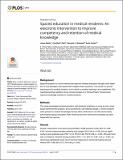| dc.contributor.author | Matos, Jason | en_US |
| dc.contributor.author | Petri, Camille R. | en_US |
| dc.contributor.author | Mukamal, Kenneth J. | en_US |
| dc.contributor.author | Vanka, Anita | en_US |
| dc.date.accessioned | 2017-11-21T20:45:17Z | |
| dc.date.issued | 2017 | en_US |
| dc.identifier.citation | Matos, Jason, Camille R. Petri, Kenneth J. Mukamal, and Anita Vanka. 2017. “Spaced education in medical residents: An electronic intervention to improve competency and retention of medical knowledge.” PLoS ONE 12 (7): e0181418. doi:10.1371/journal.pone.0181418. http://dx.doi.org/10.1371/journal.pone.0181418. | en |
| dc.identifier.issn | | en |
| dc.identifier.uri | http://nrs.harvard.edu/urn-3:HUL.InstRepos:34375272 | |
| dc.description.abstract | Background: Spaced education is a novel method that improves medical education through online repetition of core principles often paired with multiple-choice questions. This model is a proven teaching tool for medical students, but its effect on resident learning is less established. We hypothesized that repetition of key clinical concepts in a “Clinical Pearls” format would improve knowledge retention in medical residents. Methods: This study investigated spaced education with particular emphasis on using a novel, email-based reinforcement program, and a randomized, self-matched design, in which residents were quizzed on medical knowledge that was either reinforced or not with electronically-administered spaced education. Both reinforced and non-reinforced knowledge was later tested with four quizzes. Results: Overall, respondents incorrectly answered 395 of 1008 questions (0.39; 95% CI, 0.36–0.42). Incorrect response rates varied by quiz (range 0.34–0.49; p = 0.02), but not significantly by post-graduate year (PGY1 0.44, PGY2 0.33, PGY3 0.38; p = 0.08). Although there was no evidence of benefit among residents (RR = 1.01; 95% CI, 0.83–1.22; p = 0.95), we observed a significantly lower risk of incorrect responses to reinforced material among interns (RR = 0.83, 95% CI, 0.70–0.99, p = 0.04). Conclusions: Overall, repetition of Clinical Pearls did not statistically improve test scores amongst junior and senior residents. However, among interns, repetition of the Clinical Pearls was associated with significantly higher test scores, perhaps reflecting their greater attendance at didactic sessions and engagement with Clinical Pearls. Although the study was limited by a low response rate, we employed test and control questions within the same quiz, limiting the potential for selection bias. Further work is needed to determine the optimal spacing and content load of Clinical Pearls to maximize retention amongst medical residents. This particular protocol of spaced education, however, was unique and readily reproducible suggesting its potential efficacy for intern education within a large residency program. | en |
| dc.language.iso | en_US | en |
| dc.publisher | Public Library of Science | en |
| dc.relation.isversionof | doi:10.1371/journal.pone.0181418 | en |
| dc.relation.hasversion | http://www.ncbi.nlm.nih.gov/pmc/articles/PMC5536283/pdf/ | en |
| dash.license | LAA | en_US |
| dc.subject | Medicine and Health Sciences | en |
| dc.subject | Pediatrics | en |
| dc.subject | Biology and Life Sciences | en |
| dc.subject | Neuroscience | en |
| dc.subject | Cognitive Science | en |
| dc.subject | Cognitive Psychology | en |
| dc.subject | Learning | en |
| dc.subject | Human Learning | en |
| dc.subject | Psychology | en |
| dc.subject | Social Sciences | en |
| dc.subject | Learning and Memory | en |
| dc.subject | Sociology | en |
| dc.subject | Education | en |
| dc.subject | Lectures | en |
| dc.subject | Medical Education | en |
| dc.subject | Medical Humanities | en |
| dc.subject | Surgical and Invasive Medical Procedures | en |
| dc.subject | Pediatric Surgery | en |
| dc.subject | Agriculture | en |
| dc.subject | Animal Products | en |
| dc.subject | Pearls | en |
| dc.subject | Earth Sciences | en |
| dc.subject | Mineralogy | en |
| dc.subject | Minerals | en |
| dc.subject | Gemstones | en |
| dc.subject | Survey Research | en |
| dc.subject | Surveys | en |
| dc.subject | Physical Sciences | en |
| dc.subject | Mathematics | en |
| dc.subject | Statistics (Mathematics) | en |
| dc.subject | Confidence Intervals | en |
| dc.title | Spaced education in medical residents: An electronic intervention to improve competency and retention of medical knowledge | en |
| dc.type | Journal Article | en_US |
| dc.description.version | Version of Record | en |
| dc.relation.journal | PLoS ONE | en |
| dash.depositing.author | Matos, Jason | en_US |
| dc.date.available | 2017-11-21T20:45:17Z | |
| dc.identifier.doi | 10.1371/journal.pone.0181418 | * |
| dash.contributor.affiliated | Mukamal, Kenneth | |
| dash.contributor.affiliated | Matos, Jason | |
| dash.contributor.affiliated | Vanka, Anita | |
| dash.contributor.affiliated | Petri, Camille | |


